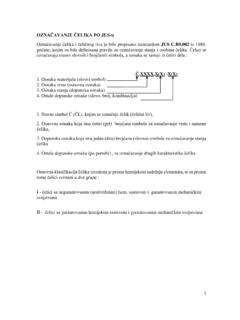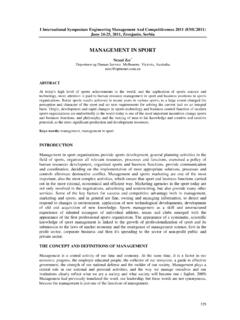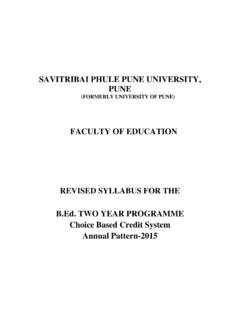Transcription of MANAGEMENT THEORIES IN EDUCATION
1 325 I International Symposium Engineering MANAGEMENT And Competitiveness 2011 (EMC2011) June 24-25, 2011, Zrenjanin, Serbia MANAGEMENT THEORIES IN EDUCATION Ivan Tasi , * University of Novi Sad, Technical Faculty "Mihajlo Pupin", Zrenjanin Dajana Tubi Economic Businees School, Od aci Jelena Tasi , Informatics teacher, Primary School "Mihajlo Pupin" Teodora Mitic Principle ,Primary School "Mihajlo Pupin" ,Veternik ABSTRACT: In the global network of modern societies, it is considered that the organization of an effective permanent EDUCATION is the key factor of economic development, and here are human resources much more significant in comparison with other resources. In fact, they are crucial factors for innovations and applicability of public activities and institutions with (these) new conditions. Moreover, the quality of EDUCATION of employees and their capability for responsibility for their own professional development is key success of every institution and organisation.
2 In specific social , economic and EDUCATION context, there is as well as need for the school MANAGEMENT . It is coincided (equated) with the MANAGEMENT which wholly covers upbringing and EDUCATION activities. The objective of this paper is exactly to point out specific features of MANAGEMENT and MANAGEMENT in EDUCATION as a more contemporary approach to school MANAGEMENT . Key words: MANAGEMENT , EDUCATION , school INTRODUCTION It became pressingly nowadays to aquire consistently new knowledges and skills in order to keep momentary position or open new exciting professional possibilities for every individual. Organizations and individuals that are at present in best positions are the ones which have achieved competence and expertness because they had comprehended that the key of such success is in permanent studying.
3 Therefore organizations and institutions need managers in EDUCATION , capable to create creative atmosphere for active learning. MANAGEMENT revolution has launched onto the surface of business / world career people possessing power, knowledge and characteristics of special, lite layer of society. It is confidered that a manager ought to have aptitude, if he wants to go in for that job. That talent is innate or not, although I do not deny the importance of pains taken in EDUCATION and persistence of an individual trying hard to achieve his / her aims. The mentioned talent appears as a substantial factor in moulding a manager with leader properties. A manager is a person which is capable to influence the others individuals, groups and organizations. MANAGEMENT DEFINING MANAGEMENT in its historical form exists from the beginning of human civilisation, but its modern concept can be connected to the middle of 19th century.
4 To the very affirmation of MANAGEMENT have contributed new knowledges from the fields of science, technics and technology. We can also, by means of MANAGEMENT , connect and reconcile different functions, various professional skills, efficiencies and experiencies. All above mentioned will help to be realised the common objective favourable results of organisation. is held to be the architect of contemporary MANAGEMENT (Stani i , 2006). 326 It is, first of all, an interdisciplinary, complex scientific field which consolidates many elements of psychology, technical and social sciences . It can be applied to nearly all aspects of life at all levels: MANAGEMENT of organisation, district, town / city, state, people, family, industry. MANAGEMENT is in broad interpretation divided into marketing, entrepreneurship, MANAGEMENT of finance, production, human resources and development, MANAGEMENT of information and administration systems and MANAGEMENT of economic laws.
5 MANAGEMENT is also defined as the process of planning, organising, leadership and controlling endeavours of all members in organisation, using all organisation resources in order to achieve designated aims (Andevski, Arsenijevi , 2010:11). Follet defines MANAGEMENT as a capability (skill, handiness) to do jobs with people, or shorter: performing jobs by other people. P. Drucker thinks that MANAGEMENT is a generic function and a specific and typical means of every organisation, irrespective of its mission (purpose). Also, according to Drucker, MANAGEMENT is giving knowledge in order to find how to apply one s know how to the best of his / her knowledge in order to produce results. Isac Adi es defines MANAGEMENT as the process of making decisions and their fulfilment. ( ). THEORIES OF ORGANISATION AND MANAGEMENT IN EDUCATION One of the most prolific authors in the field of MANAGEMENT is without any doubt Peter Drucker.
6 He emphasizes that MANAGEMENT deals with MANAGEMENT and application and controls on results, so it is consequently a technology. Meanwhile, MANAGEMENT deals with people, their values, success and development, and considering it, MANAGEMENT is a humanistic discipline. Managers are the people who use their knowledges and inventions of the humanities psychology, philosophy, economy, pedagogy, in order to concentrate them to efficiency and results. (Stani i , 2006). EDUCATION becomes today an imperative of our subsistence. Postmodern society based on science and technology considers the acquirement of new knowledges, skills and competences as an instrument of sustainability at all levels, EDUCATION of individuals, organisations, nations and societies on the whole, therefore gives an viable advantage in more changeable conditions of life and work.
7 Managing one so important developing process, therefore gets its significance and represents a scientific discipline called MANAGEMENT in EDUCATION . Here is understood managing EDUCATION of wider society: district or state (consequently EDUCATION planning, creating strategy and policy of EDUCATION ), managing the work of an educational institution (leading a school or an informal educational institution either in public or private sector), MANAGEMENT of EDUCATION and training employees in a company, MANAGEMENT in EDUCATION , and eventually as well MANAGEMENT of some processes, projects or activities in educational background. Good purposeful labour, planning and EDUCATION leading can contribute to its greater efficiency: better results of pupils at the level of institutions and processes greater competitiveness of company at the level of organization, greater employment and competitive position of nation at the level of society.
8 In view of it, great importance of headmasters is pointed out more and more in most distinct discussions all over the world. Headmasters are considered a main link in the chain of values in educational institutions, so they are requested to advance their skills and competences permanently. (Andevski, Arsenijevi , 2010:3). As in all other fields of MANAGEMENT and leadership, so in the field of MANAGEMENT in EDUCATION , there is discrepancy between theory and practice. There are THEORIES to give us some general explanations and to direct researches. They are generalized and abstract, therefore we can not say for a teory is it true or false, but we can only use it or not, Every theory is useful if it creates right anticipation of some events and if it helps us to comprehend and influence both them and their participants. ( ). As Stani i emphasizes: MANAGEMENT in EDUCATION and upbringing ought to be considered as an integral part of wider social movements and educational political efforts on the way to school reform.
9 If schools want to be directly included into their own changes, they ought to be asked both for the changes that are being undertaken in educational scheme, as well for the forms of MANAGEMENT of educational scheme and school, too. They will support best the transformations which ought to be realized through the changes. Such transformations are threefold challenge for the educational MANAGEMENT on the whole. First, it has to lead the changes in EDUCATION in the time when the character and mission of school are redefined. Second, it ought to be the integral part of new concept of state administration of the educational scheme that is totally removed from bureaucratic way of system guidance, and according to the efficient direction of public institutions in the service of its users. Third, it has to find ways and 327 apply new knowledges of MANAGEMENT in organizations that ought to learn constantly.
10 (Stani i , 2006:20). Strategical MANAGEMENT requests inspection of everything at school including as well all activities and widened hourly rate. Purpose defining is the central aspect of MANAGEMENT , and in EDUCATION (it) is expected to be focused on learning. Creating selfmanaging schools are opened greater opportunities for leaders, so that they can adopt strategical approach to MANAGEMENT . Proactive access in MANAGEMENT requests considering future during longer period of time with clear vision of future. If MANAGEMENT is reactive, it is difficult to accept long dated prospect. The difference of strategic thinking over from the operative MANAGEMENT can be seen in: 1. Focus on long dated period; 2. Creativity, capability of innovation and cancelling of out of date praxis; 3. Scannig of external background (surrounding); 4.



